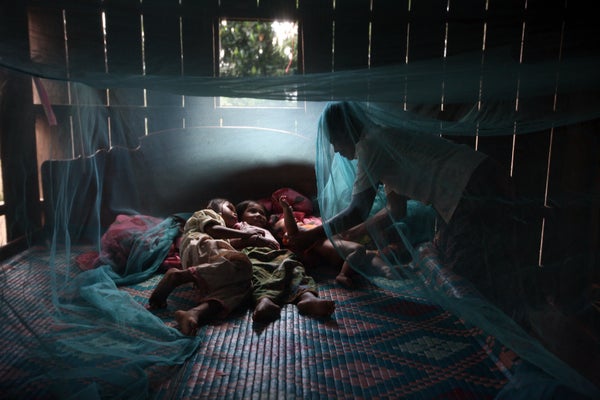It sounds like a contradiction, but it’s true: Insecticide-treated mosquito nets are effective even against some insecticide-resistant mosquitoes, a new study shows.
Why it matters:
Mosquito nets treated with insecticides are one of the most effective ways to prevent malaria. The nets work both by preventing people from being bitten and by killing mosquitoes that come in contact with the nets. But the World Health Organization has only approved one class of insecticide to use on the nets, called pyrethroids, and mosquitoes across Africa are evolving resistance to that insecticide.
On supporting science journalism
If you're enjoying this article, consider supporting our award-winning journalism by subscribing. By purchasing a subscription you are helping to ensure the future of impactful stories about the discoveries and ideas shaping our world today.
The nitty gritty:
Researchers led by Hilary Ranson at the Liverpool School of Tropical Medicine in the UK exposed Anopheles gambiae mosquitoes in the lab to insecticidal nets or untreated nets and then looked to see how long they lived. In previous research, scientists had only looked at whether the mosquitoes survived for 24 hours after touching a net, calling the ones who survived “insecticide-resistant.”
But “whether the mosquitoes live long enough to transmit disease is the really more interesting parameter,” said Ransom.
Surprisingly, in data published Monday in Proceedings of the National Academy of Sciences, they found that lots of the mosquitoes exposed to insecticides were dying after the first 24 hours. Overall, the supposedly resistant mosquitoes were living about half as long as mosquitoes that weren’t exposed to the insecticide.
And that has a big impact on malaria transmission. The researchers calculated that contact with a treated net reduced a resistant insect’s likelihood of passing along malaria by two-thirds.
You should know:
More-resistant mosquitoes lived longer after contact with the treated net. “I think it still does raise quite a lot of alarm bells for what might happen in the future,” Ransom said, if resistance continues to increase.
What they’re saying:
“This particular study is very interesting and tantalizing, but we need a lot more studies like this” to really know for sure how insecticides affect malaria transmission, said Andrew Read, the director of the Center for Infectious Disease Dynamics at Penn State University. He pointed out that the research was limited to two strains of a single of Anopheles mosquito; others of the genus also transmit malaria.
Ranson agreed, suggesting that field studies of resistant mosquitoes would be an important next step.
The bottom line:
Treated bed nets are still working, despite mosquitoes’ growing resistance, but monitoring resistant strains and developing new insecticides will be important going forward.
Republished with permission from STAT. This article originally appeared on July 11, 2016.
